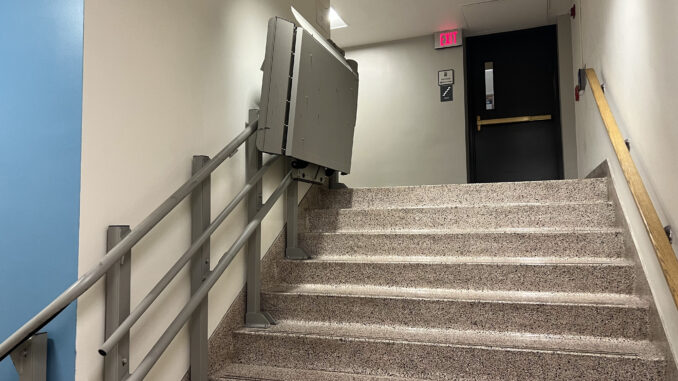
Duquesne is a unique college campus. Located in the heart of Pittsburgh, one would expect students to have to walk through traffic to get to classes and possibly even take buses, but that isn’t the case. The university is built on a hill, giving it a unique feel of being away from the city, even though it is steps away. However, the hill and many other areas on campus cause issues for students with physical disabilities, but Duquesne Disability Services wants to help every student they can.
Director Tiana Brophy and Assistant Director Margaret Allen want to accommodate any challenges that students with disabilities may face on campus.
“Our heart is in this work,” Brophy said. “We strive to support their success. So many students need an extra layer of support, and we’re here to do that.”
“We want students to seek out our services if they need it,” Allen said. “We’re always here to help them, whether that be getting paperwork in place, discussing accommodations and anything else.”
Sophomore Nicolette Topping appreciates all that Disability Services has done for her.
“I struggle getting around with my mobility aide, and they’ve helped me so much,” Topping said. “They’ve provided me with living accommodations, elevator privileges and so much more. I cannot thank them enough.”
Allen wants to make campus even more accessible to current and future students, even if it is a slow process.
“It’s really hard to hear that students are struggling because we want to be as accessible as possible,” Allen said. “It just takes time. We’re talking to admissions about more accessible tours for future students, getting better signage on doors, getting better fonts on signs.
“We want to be more accessible all around. We’re working with so many other offices so we can make everything more accessible. We are ADA compliant, but that’s not always enough. We want to go beyond that.”
The Americans with Disabilities Act (ADA) was passed in 1990. The act prohibits discrimination based on disability, and requires covered employers to provide reasonable accommodations to employees with disabilities. It also imposes accessibility requirements on public accommodations, according to the ADA website. The act was also amended in 2008 by President George W. Bush, to broaden what was defined as a disability.
Disability Services knows that coming to college with a disability can be challenging and different from high school, but they want to make a smooth transition for students.
“In high school, they use a lot of accommodations to promote success. In college, we have a priority to promote access and to put things in place so it’s a level playing field,” Brophy said. “We want [having a] disability to not have to be a barrier to success, so by leveling the field, they can succeed.”
Senior Audriana Michrina has struggled getting around, but knows Disability Services is doing its best.
“Before I got my current wheelchair, my friends would have to push me up and down the hills around campus,” Michrina said. “Disability Services can’t control the hills, but they always made sure I was informed on my options, which I really appreciated.”
Brophy wants students to always feel welcomed, and wants them to be comfortable coming to them with disability issues.
“We have an intentional, collaborative process,” Brophy said. “Everything is very individualized, making sure it’s equal for everyone.”
Michrina has worked with Disability Services throughout her entire time at Duquesne, and thinks they have been very helpful.
“They’ve helped me with getting housing accommodations when I lived on campus,” Michrina said. “They told me that I could ask DUPO for a ride to class.
“They even helped me a lot once I moved off campus. They provided me with an accessible parking spot and made sure I could still get to my classes. Whenever I have an issue, I always express it to them, and they always try to fix it.”
Disability Services doesn’t just deal with physical disabilities. The office also helps people with psychological and learning disabilities.
“Students need to provide proper documentation, which is something we’re willing to help them with,” Allen said. “We want to work with them to make sure they get the reasonable accommodations they need, whether that be more testing time or extended deadline.”
Allen even wants to make the dorms on campus more accessible to students as well.
“Adding more accessible doors is a big priority for us,” Allen said. “We test every door ourselves. We just need to be told about the issues so we can work on them.”
Disability Services wants to work with other clubs and organizations with assisting and informing on disabilities.
“We want organizations and clubs to reach out to provide insights. We can do inclusivity training and educate them more,” Allen said. “We always want to do programming to educate more students so they know we are here to help.
“We want to make sure that everyone has everything they need. Educating people is a priority to us.”
Working with Disability Services is a continuous, collaborative process, according to Brophy. Accommodations are different for every student.
Students who want to meet with Disability Services can find them in rooms 305 and 309 of the Union.
“Like I mentioned before, being ADA compliant is just the bare minimum,” Allen said. “Sure all the door handles are compliant, but are the doors too heavy? Are all the bathrooms truly accessible? Are the classrooms as accessible as they can be?
“We’re here to help. Students just need to reach out, and we’ll be here to talk and to help them with almost anything.”
